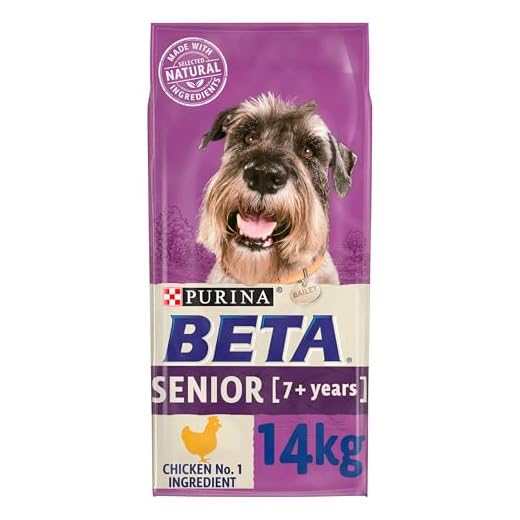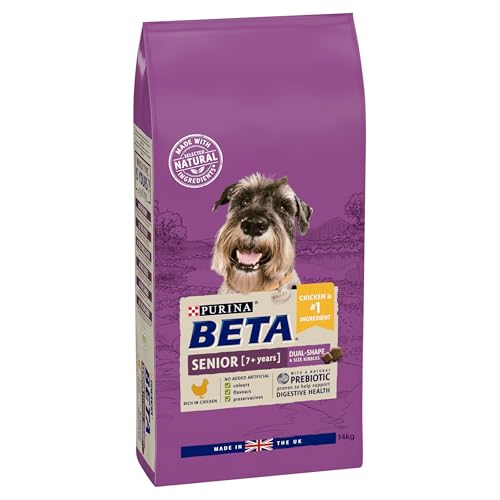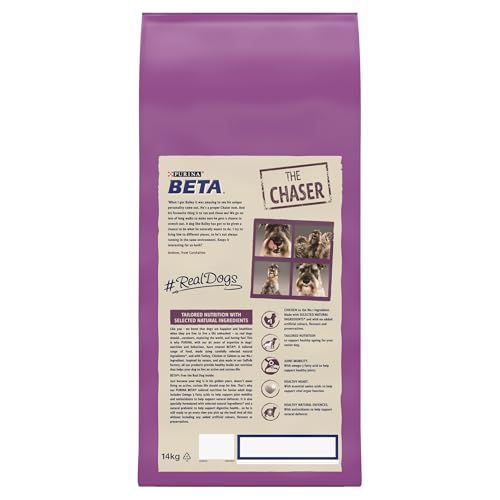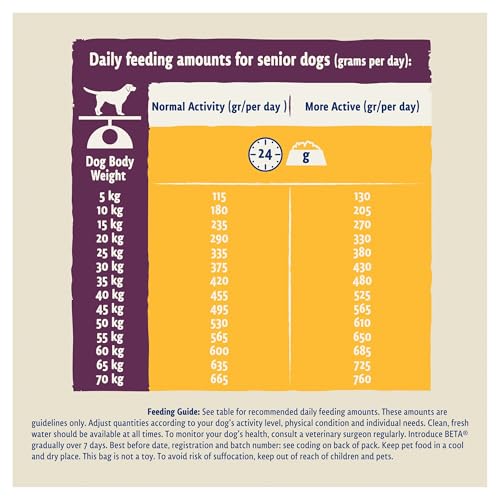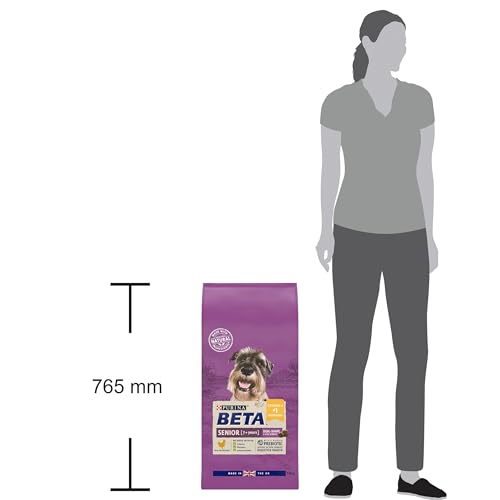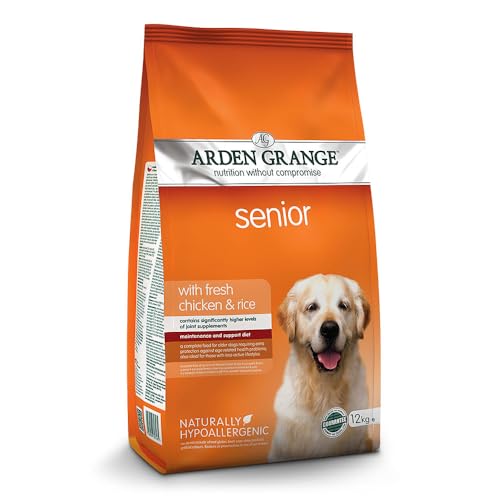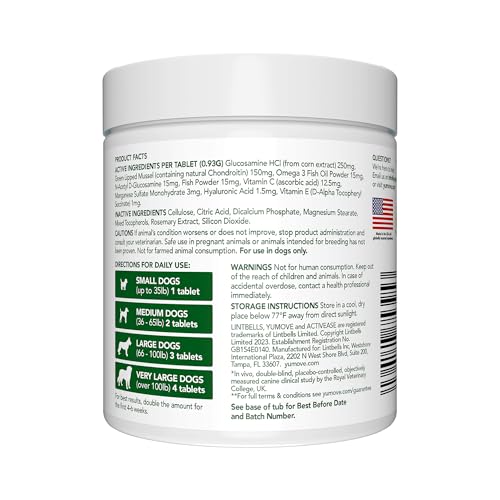




As a devoted pet owner, watching my beloved dog struggle with arthritis was heartbreaking. The stiff joints, difficulty in moving, and evident discomfort were clear signs that my once energetic companion was facing the challenges of aging. Understanding that diet plays a crucial role in managing arthritis, I embarked on a quest to find the best dog food specifically formulated for older dogs with this condition in the UK.
Arthritis in dogs is not just a matter of discomfort; it significantly impacts their quality of life. The right nutrition can make a world of difference, providing relief from inflammation and pain, and even improving mobility. It was essential for me to find food that was not only nutritionally balanced but also contained ingredients known to support joint health.
In my search, I discovered a variety of specialised dog foods available in the UK market. Each product claimed to offer unique benefits, from high levels of Omega-3 fatty acids to added glucosamine and chondroitin. However, it was important to delve deeper into these claims, understand the ingredients, and choose a diet that would genuinely benefit my aging dog.
Through research and consultation with veterinarians, I compiled a list of the most recommended dog foods for older dogs with arthritis. This guide aims to share my findings, offering insights into the best options available in the UK, so you can make an informed decision for your furry friend’s well-being.
Optimal Nutrition for Senior Dogs with Arthritis in the UK
As our loyal companions age, they often face new health challenges, one of the most common being arthritis. This painful condition can significantly impact their quality of life, making it essential to provide them with the right diet to support joint health and overall well-being. After extensive research and consulting with veterinarians, I have identified key factors to consider when selecting food for older dogs suffering from arthritis in the UK.
Older dogs require a balanced diet that not only addresses their nutritional needs but also supports joint health. Specialised dog food formulated for seniors often includes ingredients like glucosamine, chondroitin, and omega-3 fatty acids, which are known to alleviate the symptoms of arthritis. Let’s explore some of the most effective dietary options available for our ageing pets.
Key Ingredients to Look for
When choosing food for dogs with arthritis, it’s crucial to focus on certain ingredients that have proven benefits:
- Glucosamine and Chondroitin: These supplements help in rebuilding cartilage and maintaining joint health, reducing the pain and discomfort associated with arthritis.
- Omega-3 Fatty Acids: Found in fish oil, these fatty acids possess anti-inflammatory properties that can help reduce joint inflammation and pain.
- Antioxidants: Ingredients like vitamins C and E support the immune system and help combat oxidative stress, which can exacerbate arthritis symptoms.
- High-Quality Protein: Maintaining muscle mass is important for mobility, so look for foods with high-quality, easily digestible protein sources.
Several brands in the UK offer specialised dog food that includes these beneficial ingredients. Here are a few options that stand out:
- Hill’s Science Plan Senior Dog Food: This range includes a blend of omega-3 fatty acids, glucosamine, and chondroitin, specifically designed to support joint health in senior dogs.
- Royal Canin Mobility Support: Known for its high content of EPA and DHA, this food is formulated to improve joint mobility and reduce inflammation.
- James Wellbeloved Senior Dog Food: A natural option that includes glucosamine and chondroitin, along with antioxidants and a balance of nutrients to support overall health and mobility.
Providing the right nutrition for your senior dog with arthritis can make a significant difference in their quality of life. By choosing foods rich in joint-supporting ingredients, you can help manage their symptoms and keep them comfortable and active for as long as possible.
Understanding Arthritis in Older Dogs: Symptoms and Causes
Arthritis in older dogs is a common issue that many pet owners face as their furry companions age. I’ve noticed that it can significantly impact a dog’s quality of life, causing pain and limiting mobility. Recognising the symptoms early and understanding the underlying causes can help manage the condition more effectively, ensuring our beloved pets remain comfortable and happy in their senior years.
One of the first signs I observed in my older dog was a noticeable stiffness, especially after periods of rest. This stiffness often eased as she moved around, but it was a clear indicator of joint discomfort. Other symptoms to watch for include limping, reluctance to climb stairs or jump onto furniture, and a general decrease in activity levels. Some dogs may also display behavioural changes, such as irritability or depression, due to the persistent pain.
Causes of Arthritis in Senior Dogs
The causes of arthritis in older dogs can be multifaceted. Understanding these can provide insight into how to better care for our aging pets. Here are some common factors:
- Genetics: Certain breeds are more predisposed to developing arthritis due to their genetic makeup. For instance, larger breeds like Labrador Retrievers and German Shepherds are often more susceptible.
- Previous Injuries: Dogs that have suffered joint injuries in the past, such as fractures or ligament tears, are at a higher risk of developing arthritis as they age. These injuries can lead to joint instability and subsequent wear and tear.
- Obesity: Carrying excess weight puts additional strain on a dog’s joints, accelerating the wear and tear that leads to arthritis. Managing a healthy weight through a balanced diet and regular exercise is crucial.
- Inflammatory Conditions: Conditions like hip dysplasia or other developmental disorders can cause chronic inflammation in the joints, contributing to the early onset of arthritis.
- Normal Ageing: As dogs get older, the cartilage that cushions their joints naturally wears down. This degeneration is a normal part of the ageing process but can lead to arthritis if not managed properly.
By recognising these symptoms and understanding the various causes, we can take proactive steps to support our older dogs. Regular veterinary check-ups, maintaining a healthy weight, and providing joint supplements can all play a part in managing arthritis and improving our pets’ quality of life.
Key Nutrients to Consider in Dog Food for Arthritis
When selecting food for an older dog suffering from arthritis, it’s essential to understand the specific nutrients that can help alleviate symptoms and improve joint health. Not all dog foods are created equal, and finding one with the right balance of ingredients can make a significant difference in your dog’s quality of life.
Arthritis in dogs can be painful and debilitating, affecting their mobility and overall well-being. By focusing on specific nutrients, you can help manage their discomfort and promote healthier joints. Below, I will outline the key nutrients that you should look for when choosing dog food for a pet with arthritis.
Essential Nutrients for Joint Health
- Omega-3 Fatty Acids: These are crucial for reducing inflammation in the joints. Look for foods that contain sources like fish oil, flaxseed, or krill oil. Omega-3s help to lubricate the joints and ease the pain associated with arthritis.
- Glucosamine and Chondroitin: These compounds support cartilage health and can aid in repairing damaged joints. They are often included in specialized dog foods aimed at improving joint function and reducing pain.
- Antioxidants: Vitamins C and E are powerful antioxidants that help to combat oxidative stress in the joints. This can slow down the progression of arthritis and improve overall joint health.
- High-Quality Protein: Older dogs need high-quality protein to maintain muscle mass, which supports joint stability. Ensure the food you choose contains real meat as the primary ingredient rather than meat by-products.
- Anti-Inflammatory Ingredients: Ingredients such as turmeric and green-lipped mussel are known for their anti-inflammatory properties. Including these in your dog’s diet can help to reduce joint swelling and pain.
- Low Carbohydrates: Reducing carbohydrate intake can help manage weight, which is crucial for dogs with arthritis. Excess weight puts additional strain on joints, so a diet lower in carbs can support weight management and reduce joint stress.
By prioritising these nutrients in your dog’s diet, you can help manage arthritis symptoms more effectively. Always consult with your vet to tailor your dog’s nutritional needs specifically to their condition. With the right diet, you can make a significant impact on their joint health and overall comfort.
Highly Recommended Dog Food Brands for Senior Dogs with Arthritis in the UK
As our beloved dogs age, they often face health challenges such as arthritis, which can significantly affect their mobility and overall quality of life. It’s crucial to provide them with nutrition tailored to their specific needs to help manage their condition and support their joint health. Over the years, I’ve found that certain dog food brands offer exceptional formulations for senior dogs struggling with arthritis in the UK.
In my search for the best nutritional support for older dogs, I’ve come across several brands that stand out due to their carefully balanced ingredients and targeted benefits for joint health. These brands not only focus on providing essential nutrients but also incorporate elements that can alleviate the symptoms of arthritis and improve the overall wellbeing of our furry friends.
Recommended Dog Food Brands
- Royal Canin Mobility Support: This brand is well-known for its specialised veterinary diets. The Mobility Support formula contains a unique blend of nutrients, including omega-3 fatty acids and glucosamine, which are essential for joint health. The addition of antioxidants helps combat inflammation, making it a solid choice for dogs with arthritis.
- Hill’s Prescription Diet j/d: Hill’s offers a prescription diet specifically designed for joint care. This food is rich in EPA (eicosapentaenoic acid) and DHA (docosahexaenoic acid), which are types of omega-3 fatty acids that support joint health and reduce inflammation. Its clinically proven formula can help improve mobility in as little as 21 days.
- Purina Pro Plan Veterinary Diets Joint Mobility: Purina’s Joint Mobility diet is another excellent option, formulated with high levels of EPA, glucosamine, and chondroitin. These ingredients are vital for maintaining healthy cartilage and joints. This diet also includes antioxidants to support a strong immune system.
In addition to these brands, it’s important to consult with your veterinarian to determine the best dietary approach for your dog’s specific needs. Regular check-ups and tailored nutritional plans can make a significant difference in managing arthritis and ensuring your senior dog enjoys a comfortable, active life.
Homemade Dog Food Recipes for Senior Dogs with Arthritis
As our dogs age, their dietary needs change, especially when they suffer from arthritis. I found that homemade dog food can be a wonderful way to provide my senior dog with the nutrients he needs while also managing his arthritis symptoms. By preparing meals at home, I can ensure he’s getting high-quality ingredients and the right balance of nutrients to support his joints.
One of the benefits of making dog food at home is the ability to tailor the ingredients to suit my dog’s specific needs. For instance, incorporating anti-inflammatory foods and supplements can help alleviate arthritis pain. Below, I’ll share some of the recipes and ingredients that have worked well for my arthritic senior dog.
Nutrient-Rich Recipes for Joint Support
When creating meals for my dog, I focus on ingredients that promote joint health and reduce inflammation. Here are some of the key components I include:
- Lean Proteins: Chicken, turkey, and fish are excellent sources of protein that help maintain muscle mass and support overall health.
- Omega-3 Fatty Acids: Found in fish oil and flaxseed, these fatty acids have anti-inflammatory properties that can ease arthritis symptoms.
- Fruits and Vegetables: Blueberries, sweet potatoes, and spinach provide essential vitamins and antioxidants.
- Glucosamine and Chondroitin: These supplements can be added to meals to support cartilage health.
Here are a couple of my go-to recipes that are both nutritious and appealing to my senior dog:
-
Chicken and Vegetable Stew:
- 2 cups diced chicken breast
- 1 cup chopped carrots
- 1 cup sweet potatoes, cubed
- 1/2 cup peas
- 2 tablespoons fish oil
- 2 cups water or low-sodium chicken broth
Combine all ingredients in a pot and simmer until the chicken is fully cooked and vegetables are tender. Let it cool before serving.
-
Salmon and Quinoa Bowl:
- 1 cup cooked salmon, flaked
- 1 cup cooked quinoa
- 1/2 cup steamed broccoli
- 1/4 cup blueberries
- 1 tablespoon flaxseed oil
Mix all ingredients together and serve. This meal is packed with omega-3 fatty acids and antioxidants.
Preparing homemade dog food has made a noticeable difference in my dog’s mobility and overall well-being. It’s heartwarming to see him enjoy his meals and benefit from the extra care put into his diet.
Supplements to Boost Your Dog’s Diet for Joint Health
As our dogs age, they often face joint issues that can impact their mobility and overall quality of life. I’ve found that incorporating specific supplements into their diet can make a significant difference. These additions can help manage discomfort and maintain joint function, ensuring our furry companions stay active and happy for longer.
While many commercial dog foods offer a base level of nutrients, older dogs, especially those with arthritis, often benefit from additional support. Here, I’ll share some key supplements that can enhance your dog’s diet and support their joint health.
Essential Joint Health Supplements
- Glucosamine: This natural compound is found in healthy cartilage. Adding glucosamine to your dog’s diet can help repair and maintain cartilage, reducing pain and improving joint function.
- Chondroitin: Often paired with glucosamine, chondroitin sulfate helps prevent the breakdown of cartilage. It works by blocking destructive enzymes that target joint cartilage, offering a protective effect.
- Omega-3 Fatty Acids: Found in fish oil, these fatty acids are known for their anti-inflammatory properties. Supplementing with omega-3s can help reduce joint inflammation and pain, making movement easier for your dog.
- MSM (Methylsulfonylmethane): This supplement is known for its anti-inflammatory and pain-relieving properties. MSM can help reduce joint pain and improve your dog’s mobility over time.
When introducing new supplements, it’s important to do so gradually and monitor your dog’s response. Consult with your vet to ensure these additions are appropriate for your dog’s specific needs and conditions.
Adding these supplements to your dog’s diet can provide the extra support they need to manage arthritis and maintain an active lifestyle. By taking these steps, we can help our furry friends enjoy their golden years with greater comfort and ease.
Tips for Transitioning Your Dog to a New Arthritis-Friendly Diet
Transitioning your older dog to a new arthritis-friendly diet can be a smooth process with the right approach. It’s crucial to ensure that the change does not cause any digestive issues or additional stress for your pet.
Here are some helpful tips to make the transition as seamless as possible:
Steps to Transition Your Dog’s Diet
-
Gradual Introduction: Start by mixing a small amount of the new food with your dog’s current food. Gradually increase the proportion of the new food over 7-10 days.
-
Monitor Your Dog’s Response: Keep an eye on your dog’s stool, energy levels, and overall health. If you notice any adverse reactions, consult your vet.
-
Maintain Consistency: Stick to regular feeding times and ensure you are providing the same amount of food daily to avoid any digestive disruptions.
-
Consult Your Vet: Before making any changes to your dog’s diet, it’s always a good idea to discuss your plans with your veterinarian, especially if your dog has existing health issues.
-
Hydration: Ensure your dog has access to plenty of fresh water, as some arthritis-friendly diets may affect their hydration needs.
-
Incorporate Supplements: Depending on your vet’s advice, you might want to add supplements like glucosamine or omega-3 fatty acids to support joint health.
Transitioning your dog to a new diet aimed at alleviating arthritis symptoms can significantly improve their quality of life. By following these tips and working closely with your vet, you can help your furry friend enjoy a more comfortable and active life.
Remember, patience and consistency are key during this transition. Each dog is unique, so tailor the process to suit your pet’s specific needs and conditions.
Best Dog Food For Older Dogs With Arthritis Uk
Features
| Part Number | 12231689 |
| Model | 12531980 |
| Color | transparent |
| Release Date | 2014-05-23T00:00:01Z |
| Size | 1 count (Pack of 1) |
Features
| Part Number | 02AAT12 |
| Model | 02AAT12 |
| Color | transparent |
| Release Date | 2016-06-08T00:00:01Z |
| Size | 12 kg (Pack of 1) |
| Language | English |
| Price history for Autarky Grain Free Turkey & Potato Dog Food | |
|---|---|
|
Latest updates:
|
|
Features
| Part Number | FOOD10JOINT |
| Model | 195531/3855 |
| Color | transparent |
| Release Date | 2015-03-30T00:00:01Z |
| Size | 10 kg (Pack of 1) |
| Language | English |
Features
| Part Number | GR00142212 |
| Model | 195511/3854 |
| Color | transparent |
| Release Date | 2015-03-30T00:00:01Z |
| Size | 10 kg (Pack of 1) |
| Language | English |
| Price history for Pooch & Mutt Health & Digestion Dog Food | |
|---|---|
|
Latest updates:
|
|
Features
| Part Number | ASE7120 |
| Model | ASE7120 |
| Color | transparent |
| Release Date | 2012-09-19T00:00:01Z |
| Size | 12 kg (Pack of 1) |
| Language | Spanish |
| Price history for Arden Grange Senior Dry Dog Food | |
|---|---|
|
Latest updates:
|
|
Features
| Size | 300 g (Pack of 1) |
Features
| Part Number | 5060711700014 |
| Is Adult Product | |
| Size | 60 count (Pack of 1) |
| Language | English |
Features
| Part Number | YMS120 |
| Model | YMS120 |
| Warranty | 2 year Manfacturer |
| Color | White |
| Size | 120 Tablets |
Q&A:
What is the best type of dog food for older dogs with arthritis?
The best type of dog food for older dogs with arthritis is one that is specifically formulated to support joint health. Look for foods that contain ingredients such as glucosamine and chondroitin, which help maintain joint cartilage, as well as omega-3 fatty acids from fish oil, which can reduce inflammation. Brands like Hill’s Science Plan, Royal Canin, and Arden Grange offer senior dog foods with these beneficial ingredients.
Are there any special dietary considerations for senior dogs with arthritis?
Yes, there are several dietary considerations for senior dogs with arthritis. In addition to joint-supporting ingredients like glucosamine and chondroitin, it’s important to maintain a healthy weight for your dog to reduce stress on their joints. Foods that are high in protein and low in fat can help manage weight while providing the necessary nutrients. Also, consider adding supplements like fish oil or turmeric to their diet for additional anti-inflammatory benefits.
Can homemade dog food be beneficial for older dogs with arthritis?
Homemade dog food can be beneficial for older dogs with arthritis if it is well-balanced and includes joint-supporting ingredients. Consult with your vet or a canine nutritionist to ensure the homemade diet meets all of your dog’s nutritional needs. Ingredients to consider include lean meats, fish, sweet potatoes, and leafy greens, along with supplements like glucosamine, chondroitin, and omega-3 fatty acids. Always introduce any dietary changes gradually to avoid digestive upset.

